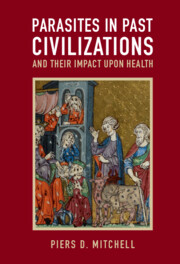Book contents
- Parasites in Past Civilizations and Their Impact upon Health
- Parasites in Past Civilizations and Their Impact upon Health
- Copyright page
- Contents
- Acknowledgements
- 1 Introduction
- 2 Near Eastern Civilizations
- 3 Ancient Egypt and Nubia
- 4 The Prehistoric Peoples of Europe
- 5 The Roman World
- 6 Medieval Europe
- 7 East Asian Civilizations
- 8 North American Indigenous Peoples
- 9 South and Central American Civilizations
- 10 Parasites, Migrations, and Epidemics
- 11 Conclusion
- Bibliography
- Index
5 - The Roman World
Published online by Cambridge University Press: 30 March 2023
- Parasites in Past Civilizations and Their Impact upon Health
- Parasites in Past Civilizations and Their Impact upon Health
- Copyright page
- Contents
- Acknowledgements
- 1 Introduction
- 2 Near Eastern Civilizations
- 3 Ancient Egypt and Nubia
- 4 The Prehistoric Peoples of Europe
- 5 The Roman World
- 6 Medieval Europe
- 7 East Asian Civilizations
- 8 North American Indigenous Peoples
- 9 South and Central American Civilizations
- 10 Parasites, Migrations, and Epidemics
- 11 Conclusion
- Bibliography
- Index
Summary
Despite major investment in sanitation infrastructure, intestinal parasites spread by faecal contamination of food and water were a particular problem everywhere in the Roman world. Similarly, ectoparasites such as lice and fleas were common despite the Roman enthusiasm for washing in communal bathhouses and the use of delousing combs. However, some parasites seem to be much more regional in their distribution, likely due to climate variations. Fish and Taenia tapeworms, spread by eating raw or undercooked fish, pork, or beef were more common in northern Europe than southern Europe, possibly due to the fact that the hot climate in the south made raw fish and meat go off faster than in the cooler north. In contrast, malaria seems to have been much more common in the Mediterranean region than in northern Europe, as the warm climate of the south created breeding sites for the Anophales mosquito, which transmitted the parasite. Roman period medical texts by Galen and other physicians showed awareness of a number of parasites and tried to explain them in the context of the humoral theory. Treatment involved trying to rebalance the humours in order to return the individual to health.
Keywords
- Type
- Chapter
- Information
- Publisher: Cambridge University PressPrint publication year: 2023

